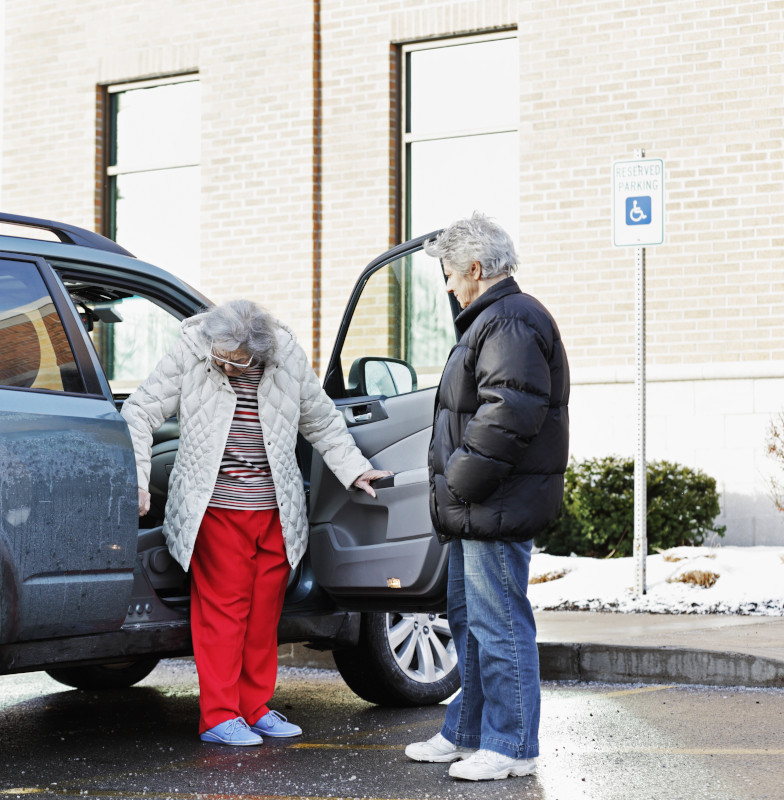AARP Eye Center
Nonprofit offers non-emergency medical transport in Bedford County
The call came from a woman who had an agonizing toothache but no way to get to her dentist’s office. That used to be a vexing problem in Bedford County, Virginia’s fifth largest locality by land area. Years ago, residents in such circumstances might have to suffer in silence at home – or wait until the pain prompted them to dial 911 and seek emergency care.

But the prospective dental patient’s call for help went to Bedford Ride, which provides non-emergency medical transportation, recalled program manager Linda Brake. Thanks to community support “and the generosity of a volunteer, we were able to provide her with the transportation she needed,” Brake said.
“Her relief and gratitude were profound, underscoring the essential role Bedford Ride plays in easing the burdens of those in distress.”
The nonprofit service is celebrating 23 years of helping cancer patients, dialysis patients, veterans, older people and other community members get to their doctor’s appointments.
“Our program provides non-emergency medical transportation services to individuals in Bedford County and the Town of Bedford who do not drive or have support for a ride,” Brake said. “Currently, we have a fleet of 20 wheelchair-accessible vans and one additional car to accommodate various needs within the community.”
Brake discussed Bedford Ride during a recent webinar moderated by Brian Jacks, AARP Virginia’s associate state director for community outreach in the southwest areas of the commonwealth.
Jacks, who lives in Bedford County, noted that transportation “impacts whether a person can live safely and independently at home” – a major concern as people age. That is why Bedford Ride is an AARP Community Partner and why AARP promotes volunteer opportunities with the program.
How the program got started
In 1999, two independent studies found that “transportation was the biggest issue for Bedford County and the Town of Bedford” in terms of accessing routine health care, Brake said during the webinar. Because they lacked transportation, some residents were putting off medical appointments until they eventually needed emergency treatment, clogging local hospitals.
Maps show why transportation can be an issue in Bedford County: It covers more than 753 square miles – about twice the area of Fairfax County.
Bedford County, which has a growing population of more than 80,000 people, is located between two metropolitan areas: Lynchburg to the east and Roanoke to the west. The county seat is the Town of Bedford (with about 6,800 residents). From the town, it takes about 30 minutes to drive to downtown Lynchburg and about 40 minutes to reach downtown Roanoke.
After the studies documented the problem, a task force looked at how to address it. The result was Bedford Ride, which began operations in September 2001. Initially, the program served only the Town of Bedford, but within the first year, it expanded to cover the entire county.
“It was a grassroots effort,” Brake said.
Bedford Ride, which relies on volunteers and provides its services at low or no cost, operates under the auspices of the Central Virginia Alliance for Community Living, a nonprofit with a high rating from Charity Navigator, an independent reviewer of philanthropic organizations.
Brake noted that “Bedford Ride is independently funded and does not receive any federal or state funding that is allocated to CVACL. Bedford Ride is funded through a combination of grants, donations and fundraising efforts.”
The program receives support from the Bedford County government, the Centra Foundation and the Bedford Community Health Foundation as well as from churches, businesses and civic organizations.
Brake explained the need for Bedford Ride in a recent blog post:
“Imagine the freedom and independence that comes with having car keys in hand – the ability to go wherever and whenever you need. Now, consider those who don’t have this luxury. They face daily challenges without the simple convenience of a personal vehicle. Our service is a lifeline for many, and your contributions make it possible for us to bridge this gap.”
Brake, who has received inquiries from other localities on how to replicate Bedford Ride, said the program’s drivers are carefully screened and thoroughly trained to drive safely, protect passenger confidentiality and treat everyone with respect. Drivers do not provide medical or personal care services.
Bedford Ride has an administrative office in the internal medicine building on the Bedford Memorial Hospital campus at 1710 Whitfield Drive, Bedford. The program also has car parking areas throughout the county.
The program provides rides only for non-emergency medical purposes. Bedford County residents who need such assistance may call (540) 587-3315 or visit the program’s website.
Bedford has limited public transportation – buses that primarily serve the town. Brake said that “there’s a huge demand” for her program, which provides rides to and from medical appointments in Roanoke, Lynchburg and Salem as well as in the Town of Bedford.
Last year, Brake said, the program provided about 2,500 rides to about 120 individuals. “We’re on track to surpass” those numbers this year, she said.
People who receive rides are charged according to a sliding-fee scale. “There’s an assessment done for each client which will determine whether or not there would be any cost,” Brake said. If there is a charge, it is “very, very modest.”
“The majority of the individuals using our service pay nothing,” she said.
Even so, some people insist on paying what they can. Brake recalled that years ago, a woman who received a ride to a medical appointment in Lynchburg gave the volunteer driver 78 cents.
“That’s all she had,” Brake said. “But she wanted to contribute to her ride because that was important to her.” (Taking a taxi from Bedford to Lynchburg and back would cost at least $125.)
Libby Dickson, who currently volunteers with Bedford Ride, also spoke at the webinar. She said the volunteer work “makes you a better person.”
Dickson described taking a woman – a double amputee – to dialysis and other medical appointments every week.
“She is so appreciative,” Dickson said. “I call her my hero because she just has such a positive attitude for what she is going through. … It makes you really humble to think that they are going through all of this, yet they are so grateful for what you're doing for them. And all I’m doing is driving her somewhere.”
How you can help
Participants at the webinar noted that Bedford Ride reflects the spirit of “neighbors helping neighbors.”
Besides making donations, community members can help the program by volunteering their time. Bedford Ride has flexible volunteer opportunities for people who can pitch in at least a few hours a month.
Volunteers serve as:
· Drivers – Take individuals to non-emergency medical services. The Bedford Ride program provides the vehicles. You would drive only when it is convenient for you. Trips generally take 2-3 hours. Volunteer drivers accept only the trips that fit their schedule and when they are comfortable with the route and the client.
· Dispatchers – Match individuals with drivers and vehicles. Volunteer dispatchers work from home when it is convenient for them. Computer and internet skills are desirable but not essential.
· Car care providers – Take the Bedford Ride vehicles for routine and scheduled maintenance, cleaning and inspections. These volunteers also check the cars when trouble is reported.
All volunteers must pass background checks. Drivers receive training on how to assist people with walkers and wheelchairs.
If you are interested in volunteering, call (540) 587-3315 or visit the Bedford Ride website.
Currently, Bedford Ride takes people only to medical-related appointments. With additional volunteers, Brake would like to expand the program to provide rides for other important purposes.
“A lot of people have a need to go get a haircut or to do other non-medical things,” she said. For instance, people may need to attend a funeral, go to an exercise class or get to the train station.
“If we had more resources, we could do more,” Brake said.
For more information about Bedford Ride
· Visit the program’s website at bedfordride-cvacl.org
· Follow Bedford Ride on Facebook.
· Call (540) 587-3315. · Email program manager Linda Brake at lbrake@cvcl.org

































































